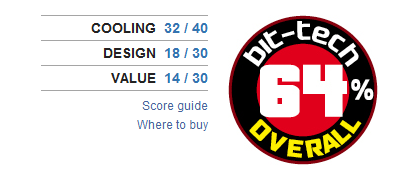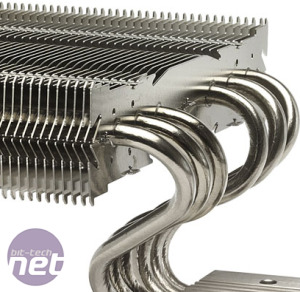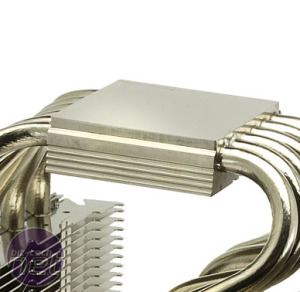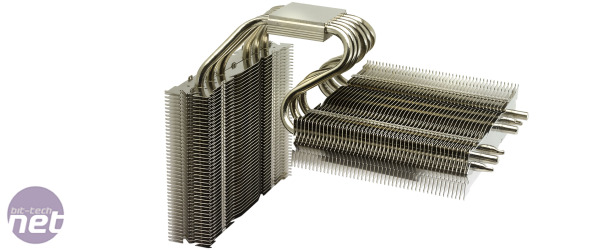
Performance Analysis
While Prolimatech has done a good job of making the Genesis surprisingly easy to fit, its sheer size quickly becomes an issue once installed. It completely obscures a motherboard’s memory sockets, and will clash with tall memory DIMMs.On most boards, the 24-pin ATX power connector will also be obscured, as will any fan headers placed around the top of the front edge of the motherboard. This makes actually assembling a system around the Genesis annoying, and will complicate any maintenance of your memory or PSU.
As the Genesis ships without cooling fans, you will also have to buy as many as three fans to use with it. For our testing, we used two 120mm Sharkoon Silent Eagle 1000 fans, as these shift a decent amount of air while also running quietly.
In our LGA1155 test rig, the Genesis coped reasonably well. While the idle delta T of the CPU was 17˚C (just 1˚C cooler than a stock Intel cooler), the peak delta T of 54˚C when the CPU was under load was far more competitive. However, the CPU under the Genesis was still 4˚C hotter than it was when under the very quiet Dark Rock Pro.
However, the Genesis was further off the pace in our Socket AM3 test system. With the two Sharkoon Silent Eagle 1000 fans supplying low-noise airflow, we saw a peak CPU delta T of 27˚C. This was 5˚C hotter than with the Thermaltake Frio at its lowest fan-speed setting, and 4˚C hotter than with the Dark Rock Pro.
Conclusion
While we can see Prolimatech’s idea behind the Genesis, the execution not only fails to justify the hype in terms of performance, but brings with it a hatful of unwanted concessions. Not least of these is the size of the cooler, which makes upgrading and maintaining your PC a hassle.Even the basic premise of downdraft cooling is generally unnecessary these days, as most memory doesn’t require active cooling and most LGA1155 and LGA1156 motherboards don’t even have heatsinks in the classic Northbridge location. Additional VRM cooling is useful, but the Genesis is overkill for this.
At £55, the Genesis doesn’t come cheap either. Once you factor in one, two or three decent fans to use with it you could be looking at a total cost of £70. Even the awesome Dark Rock Pro costs around £15 less, while the slightly more modest Dark Rock Advanced will save you £30. While the cooling ability of the Genesis will vary with the fan(s) you choose, we recommend looking elsewhere for your cooler.
Socket AM3 Score

LGA1155 Score
-
Cooling34 / 40
-
Design18 / 30
-
Value15 / 30


MSI MPG Velox 100R Chassis Review
October 14 2021 | 15:04











Want to comment? Please log in.